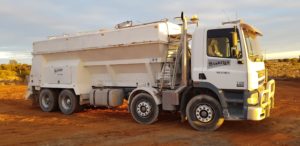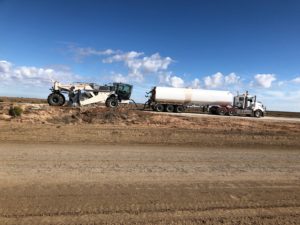Spreader
Stabilco operates a range of purpose built lime and cement spreader trucks including an articulated 4×4 all terrain spreader for particularly boggy sites. This enables the supply and distribution of a full range of binder products suitable for the insitu stabilisation process. Leading technologies are incorporated into all trucks to ensure accurate binder spread rates and containment of dust.
On board computers linked to load cells and farm scan distance measuring devices assist in assuring accurate spread rates.
All spreader trucks have sealed bulk bins to ensure the product does not start to react until it is on the ground ready to be mixed into the pavement. Spread rates (kg/m2) must vary in accordance with varying ground conditions.
Additional mat test can be carried out in order to confirm and adjust the spreading rate.
Water Truck
Especially during the drier months, water must be added to ensure optimum moisture content is maintained for compaction. Depending on soil conditions and moisture content water can be added before and or after spreading any binder or directly into the mixing chamber by linking the water truck to the mixer where appropriate. Not only is water vital to ensure optimum moisture content at compaction, water initiates the necessary chemical reactions with most binders.
Stabilising Machine
Prior to stabilisation commencing it is important to ensure the surface is prepared for stabilisation ahead of stabilisation. Preparation of a surface for stabilisation includes pegging out for stringing as necessary, trimming to approximate levels and shaping to shed water and sufficient drainage to prevent water ponding where possible. Note that due to the addition of binders and density changes, some bulking may occur, however this may also be balanced by other factors such reducing the moisture content or increasing the density of the underlying material during compaction. Immediately prior to stabilisation, the surface should be ripped to the required depth to identify and remove unsuitable material such as obstacles, organics and material too hard to stabilise. Rotary hoe type attachments to bob cats, tractors and the like are not accepted by the Industry for pavement construction as they are not mixing chambers, they do not ensure homogenous mixing or accurate depth control amongst other faults. Research shows pavements mixed with such machines often fail within 1-3 years because the binder and moisture have not been mixed thoroughly.



